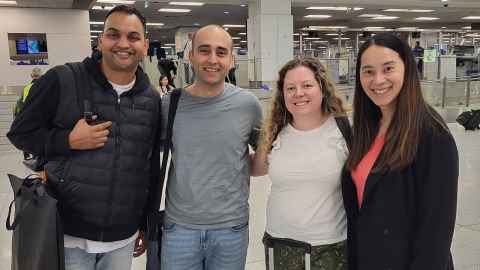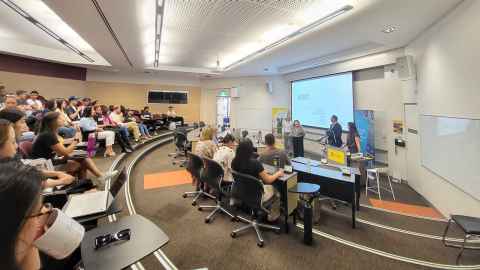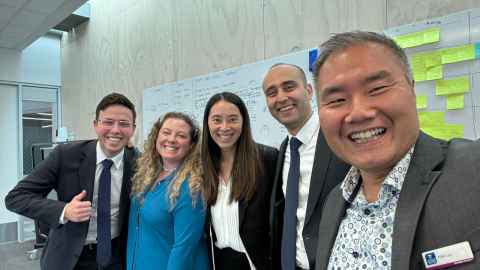Business case competition offers valuable learning experience for MBA students
21 December 2023
Four University of Auckland MBA students recently travelled to Sydney for a “friendly” business case competition with the University of New South Wales.

In an increasingly competitive corporate environment, exceptional presentation skills – along with an in-depth understanding of business case analysis – are crucial. To this end, one of the many unique opportunities that the University of Auckland’s MBA programme offers students is the ability to participate in business case competitions. Four current MBA students – Amy Liu, Emir Ay, Rebecca Crotty-Jones and Alok Vasanth – seized a recent opportunity to compete, travelling to Sydney to battle it out with the University of New South Wales in a “friendly” business case competition. The event had been organised by the two universities to provide valuable business case competition experience for both teams, and in particular to help the UNSW students prepare for an international competition in Montreal next year.
Although three members of the team came fresh from the New Zealand MBA Case Competition Nationals (Alok Vasanth stepped in at the last minute to replace Nationals team member Peter Sobko, who was unable to attend the Sydney competition due to work commitments), they found the UNSW competition an entirely different challenge. The Nationals, held at Victoria University in Wellington, gave the students a four-hour preparation period before they had to deliver a ten-minute presentation followed by ten minutes of questions. In contrast, the UNSW competition followed the format of the prestigious John Molson MBA International Case Competition, allowing the students only three hours to prepare for a 25-minute presentation of detailed slides, followed by ten minutes of questions. “The UNSW format was like presenting to the board,” explains Amy. “It was definitely more challenging – but more relevant for companies and boards.”

Unfortunately, the team lost to UNSW by only one point. “I feel we had a better idea, but lacked in presentation. We were used to ten-minute instead of 25-minute presentations,” says Amy.
It was a valuable experience nevertheless, she says. “Doing this UNSW [competition] made me even more motivated to find out more on how to better improve my finance skills and knowledge. The key insight [I took] from the competition experience was the importance of good presentation – having the confidence and persuasion to sell an idea by fully believing in our idea.”
[The MBA programme] has profoundly influenced my approach to business and professional challenges, preparing me to successfully navigate and thrive in diverse business environments.
Teammate Emir Ay described the experience of competing as “amazing”: “I am much more efficient now with the problems and requests that I am facing in business life. Additionally, I am more confident when I am presenting to the board, as I had many practices thanks to case competitions,” he explains. “The experience is very real and exactly matches with senior or executive manager requirements.”
The variety of high-level leadership, management and presentation skills the team members have developed over the course of their MBA programme proved great preparation for both the Nationals and the UNSW business case competitions. Emir drew on the “advanced communication skills” he has acquired, while Amy describes the business knowledge she has gained from her MBA studies as “particularly useful” for the competition. “The presentation skills in the leadership course, making our own TED Talk, and the business case critiquing and analysis in the globalisation course, helped us understand the worldwide effects. The supply chain, innovation, business development around negotiation, legal and economics [courses] all helped us understand the process around mergers and acquisitions, legal and business processes that businesses experience on a daily basis.” For Amy, the MBA programme has therefore gone beyond equipping her with what she describes as a “comprehensive skill-set”: “It has profoundly influenced my approach to business and professional challenges, preparing me to successfully navigate and thrive in diverse business environments.”

The business case competitions – and the MBA programme overall – also offer students an excellent opportunity to network, enabling them to form lasting connections with both their peers and industry professionals. As the programme moves from an in-person to an online offering for 2024, careful consideration has been made to ensure that these valuable networking and in-person learning activities remain an integral part of the MBA experience; in fact, the move online now extends the programme’s reach, bringing these opportunities to students nationwide. “Now students can access the same rigorous content in smaller, more digestible chunks anytime and anywhere,” explains MBA Director Mike Lee in a recent interview with NZ Business and Management magazine. “We’ve worked hard to retain the best elements of peer-to-peer learning and the interactive and highly engaging instructor-led discussions and activities that any world-class MBA is known for.”
Similarly, Amy points out that many online MBA programmes around the world have successfully integrated networking into their curriculum. “There are numerous ways to effectively build and maintain connections,” she observes. Her advice for students is to “proactively engage in these opportunities to fully leverage the networking potential of the programme.”
Amy echoes Emir in describing both the National and the UNSW business case competitions as “an amazing experience” – and although the UNSW competition itself may not have resulted in a win, the experience clearly did. “As a team, we have grown closer, understanding each other’s strengths and how we can build on these for the team’s success,” she enthuses. “The insights gained from the case competition were invaluable. It was great to be able to step out of my comfort zone and grow using the knowledge and skills from the MBA classes while networking with a bunch of amazing classmates from all different areas of industries.”